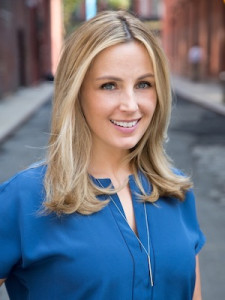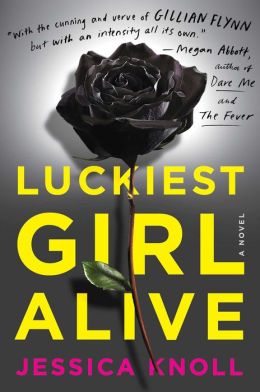From the Booking Desk:
Last Friday, I ran the full BOLO Books review of Jessica Knoll’s debut novel, Luckiest Girl Alive. Today, I am pleased to welcome Jessica herself to the blog.

BOLO Books: Tell us a bit about your debut novel, Luckiest Girl Alive.
Jessica Knoll: Luckiest Girl Alive is the story of Ani FaNelli, a twenty-eight year old woman with a seemingly perfect life. She has a glamorous job at a glossy magazine, a closet full of size two designer wares, and she’s engaged to a guy from a distinguished, moneyed family. But perfection does not come without a cost. When a documentary film crew invites Ani to tell her side of the very violent and public incident that occurred when she was a freshman at the prestigious Bradley School, her perfect façade starts to splinter and crack, forcing Ani to reconsider every choice she’s made since that fateful day.
BOLO Books: You come to fiction from the magazine world. In what ways has your work with Cosmopolitan and Self magazines helped you in writing your debut novel? How about hindrances?
Jessica Knoll: My dream had always been to come to New York after I graduated college and write a novel. I sought out a job in magazines because it allowed me to write while still being able to pay the bills. It was the best education I could have asked for—it gave me a few years to develop as a writer and to find my voice and my perspective.
BOLO Books: Luckiest Girl Alive deals with a few very hot-button, topical social ills (I am being intentionally vague here as too much information would constitute major spoilers). I wonder where the novel started – with the characters or with the social elements?
Jessica Knoll: Before I sat down to write the book, I decided I wanted it to hit three notes—I wanted the main character to have a distinct, polarizing voice, I wanted to incorporate a crime that was ripped from the headlines, and I wanted to give it a heart. My goal was to marry those elements, so no one took precedence over the other.
BOLO Books: Much of the novel deals with reinvention. One of the first things your protagonist does is change or alter her actual name. Why do you think names are so important to people? Have you ever wanted a different name yourself?
Jessica Knoll: Identity is at the core of Luckiest Girl Alive. As women, we are inundated with so many messages about what our lives need to look like in order to be happy. It can be difficult to tune out the fuzz and chart your own course. I wanted to show how women wear a lot of different hats in order to please different people in their lives. As Tif to her mother, she is an obedient daughter. As Finny to the cool kids at school, she’s the new girl, desperate to please. And as Ani to her fiancé, she’s a trophy-wife-in-training with just the right amount of edge.
BOLO Books: Ani FaNelli is another in a current crop of unreliable and somewhat unlikable narrators, similar to those in Gone Girl and The Girl on the Train. Are you a fan of these types of characters? Why or why not?
Jessica Knoll: I defer to Reese Witherspoon on this one, who said in a New York Times interview, regarding playing Cheryl Strayed in Wild, “Can we scrub the likable box? And what is likable? To me, likable is human, and real, and honest.” That’s exactly how I view Ani—she’s flawed, yes, but she’s also deeply human. For me, that’s what makes the most compelling characters. (Note to readers: Reese Witherspoon hopes to produce the film version of Luckiest Girl Alive for Lionsgate.)
BOLO Books: In Luckiest Girl Alive, Ani is taking part in a documentary about her time at The Bradley School in the hopes of allowing the public to see the real truth. Are you a fan of documentaries? Do you have any favorites to suggest to BOLO Books readers?
Jessica Knoll: I’m a huge fan of documentaries. Hopefully by the time this interview runs, I’ve seen Montage of Heck, the new Kurt Cobain documentary, which is supposed to be excellent. I also really enjoyed the five-part docuseries, The Jinx, on HBO, Blackfish, a psychological thriller about a captive orca whale responsible for the deaths of several trainers at SeaWorld, and There’s Something Wrong with Aunt Diane, the doting mother who drove the wrong way on the Taconic Parkway in upstate New York, killing herself and seven others. I sound pretty morbid listing these! I become obsessed with understanding how bad things happen. I need to analyze the psyche of it all in order to make sense of the world.
BOLO Books: Teachers are very important role models for our children. Can you talk a bit about your feelings on the teacher/student dynamic and how that manifests itself in the novel?
Jessica Knoll: Well, of course it’s a very important dynamic, though it wasn’t necessarily one I was trying to comment on in the book. I created Mr. Larson, Ani’s English teacher, because I needed a character who always saw Ani for who she really was—who could weed out her many personas, and help her see that there was no need to apologize for her true self.
BOLO Books: The cover design for Luckiest Girl Alive is stellar. What, if any, input did you have on this decision?
Jessica Knoll: Not much! I was given several options. My favorite was deemed too kitschy to be commercially appealing. I didn’t mind though. When you have an incredible team like the one I do at Simon & Schuster, you trust that they know what they’re doing!
BOLO Books: Your novel has received blurbs from some heavy-hitters in the industry – such as Megan Abbott and John Searles. What was it like reading those for the first time?
Jessica Knoll: I’m a huge fan of Megan Abbott’s so that was a big thrill. John Searles is a good friend—he hired me as his assistant at Cosmo when I first moved to New York! I told him I would air all his dirty laundry if he didn’t give me a glowing review. All kidding aside, John was an incredibly important role model for me. I saw that it was possible to write a book and have it published, that it wasn’t this Herculean feat I’d made it out to be. John wrote three incredible, gripping novels as an editor at Cosmo. He used to take me to the books closet and wave his arms at the hundred and hundreds of copies in there and say, “Jess, if all these people can do it, you can do it too.”
BOLO Books: If forced to choose only one format for all your future reading, which would you choose: Hardback, trade paperback, mass-market paperback, or e-book? And why?
Jessica Knoll: I don’t discriminate! Just give me a good story, a quiet corner, and a glass of wine, and I’m in heaven.
From the Booking Desk:
Now, come on readers, how can you resist that? When this book comes up in conversation this summer season, don’t be left out – Read it today! Thanks for stopping by Jessica.

